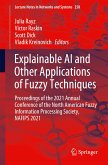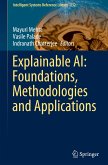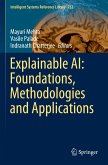The importance of Trustworthy and Explainable Artificial Intelligence (XAI) is recognized in academia, industry and society. This book introduces tools for dealing with imprecision and uncertainty in XAI applications where explanations are demanded, mainly in natural language.
Design of Explainable Fuzzy Systems (EXFS) is rooted in Interpretable Fuzzy Systems, which are thoroughly covered in the book. The idea of interpretability in fuzzy systems, which is grounded on mathematical constraints and assessment functions, is firstly introduced. Then, design methodologies are described. Finally, the book shows with practical examples how to design EXFS from interpretable fuzzy systems and natural language generation. This approach is supported by open source software.
The book is intended for researchers, students and practitioners who wish to explore EXFS from theoretical and practical viewpoints. The breadth ofcoverage will inspire novel applications and scientific advancements.
Design of Explainable Fuzzy Systems (EXFS) is rooted in Interpretable Fuzzy Systems, which are thoroughly covered in the book. The idea of interpretability in fuzzy systems, which is grounded on mathematical constraints and assessment functions, is firstly introduced. Then, design methodologies are described. Finally, the book shows with practical examples how to design EXFS from interpretable fuzzy systems and natural language generation. This approach is supported by open source software.
The book is intended for researchers, students and practitioners who wish to explore EXFS from theoretical and practical viewpoints. The breadth ofcoverage will inspire novel applications and scientific advancements.
"The book is self-contained and this feature could appeal to all readers who are novices to the area of fuzzy sets and granular computing. In sum, this is a timely, comprehensive, thorough, and authoritative treatise on explainable fuzzy systems that could be a vital interest to the broad research community." (Witold Pedrycz, zbMATH 1470.93089, 2021)








